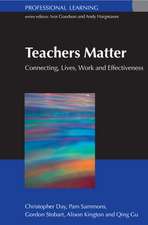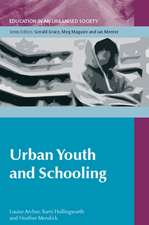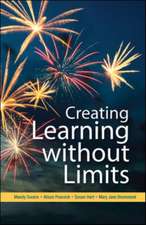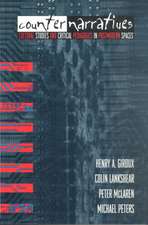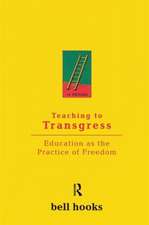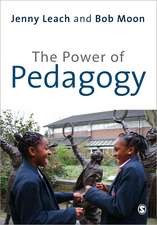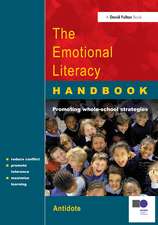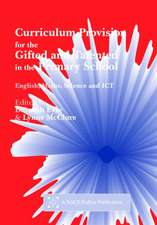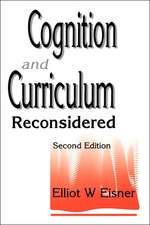Sowing the Seeds of Character: The Moral Education of Adolescents in Public and Private Schools
Autor Judd Kruger Levingstonen Limba Engleză Hardback – 7 iun 2009 – vârsta până la 17 ani
Preț: 363.98 lei
Preț vechi: 501.77 lei
-27% Nou
Puncte Express: 546
Preț estimativ în valută:
69.66€ • 71.96$ • 57.97£
69.66€ • 71.96$ • 57.97£
Carte tipărită la comandă
Livrare economică 25 martie-08 aprilie
Preluare comenzi: 021 569.72.76
Specificații
ISBN-13: 9780313351914
ISBN-10: 0313351910
Pagini: 204
Dimensiuni: 156 x 235 x 23 mm
Greutate: 0.45 kg
Editura: Bloomsbury Publishing
Colecția Praeger
Locul publicării:New York, United States
ISBN-10: 0313351910
Pagini: 204
Dimensiuni: 156 x 235 x 23 mm
Greutate: 0.45 kg
Editura: Bloomsbury Publishing
Colecția Praeger
Locul publicării:New York, United States
Caracteristici
Ideas and examples for the classroom practice of moral education
Notă biografică
Judd Kruger Levingston is a rabbi and educator. He lives in Philadelphia where he teaches at a Jewish day school and at Temple University.
Cuprins
Series ForewordAcknowledgmentsIntroduction: From Baseball Fields to Schools1 Did You Ask a Good Question Today? Questions at the Heart of Moral Education2 Character Studies: Three Moral Outlooks and the Role of Gender3 Authentic and Assured4 Bridging and Binding5 Constructing and Considering6 Play: Getting into CharacterAppendix: Interview ProtocolsNotesBibliographyIndex
Recenzii
Rabbi and educator Levingston (Jewish studies, Barrack Hebrew Academy, and Temple U., Philadelphia) has taught and served as an administrator in a variety of middle and high schools, and holds a doctorate in moral education from the Jewish Theological Seminary, New York. He argues that moral education is not a luxury but rather a self-conscious and deliberate effort to teach young people about integrity, respect, care for oneself, care for the world, and principles of justice and freedom. Drawing on his own professional and personal experiences and from research in Muslim, Jewish, Roman Catholic, public, Quaker, and Chinese schools, he offers suggestions on how educators can incorporate moral education into the existing curriculum through their own examples, through critical thinking and role-playing exercises, and through real-world applications to peer interactions outside the classroom. For educators, policymakers, and parents.
A rabbi and educator, the author addresses the challenges of and techniques for conducting the moral education of adolescents, in public or private schools-recognizing that this is a fundamental part of their mission, whether conducted explicitly or only implicitly.
In an era of standards and demoralizing statistics, Sowing the Seeds of Character is a thoughtful and serious reflection on those qualitative, interpersonal, environmental factors that are so often overlooked in self-studies and assessments. Drawing on his own diverse experience as an educator, Levingston collects data on intangibles - impressions of entering a school and the relationships that exist, observations of teaching styles and the ways teachers empower their students to engage difficult questions, and even-handed comparisons of individual and collective approaches to the question of identity - to discern where and how moral education is happening in schools. Weaving observations together, Levingston. . . offers a profound glimpse of the hidden curricula that shape schools. While the author develops new categories to describe schools' approaches to moral education and makes an original and compelling pitch to revisit the role of 'play' in developing character, the book's most valuable contribution is its modeling of substantive, hope-filled reflection on what it means to shape students not only as academics or members of a community but as citizens of an increasingly pluralistic world.
.the volume is very accessible, easy to read, well organized, and peppered with the author's own experiences as a parent and educator. Highly recommended. General readers and all undergraduate students.
.exceptional.Clearly, Sowing the Seeds of Character is a particularly timely contribution in an era that is likely to measure school success by test scores.
His choice to paint a portrait rather than prescribe a pedagogy enable his readers to use this book to ask their own questions and catalyze their own growth. Parents and educators who take a virtual tour through the schools and classrooms that Levingston describes will be motivated to take a fresh look at the nexus of transmission of values and personal meaning-making that is so crucial to the goal of Jewish education.
Levingston's voice offers an important contribution to our society's public discourse about the nation's common civic society. With so many unhelpful contributions dominating the debates about the merits of everything from charter schools to homeschooling, Levingston's voice is welcomed as thoughtful, sensitive, and positive.
A rabbi and educator, the author addresses the challenges of and techniques for conducting the moral education of adolescents, in public or private schools-recognizing that this is a fundamental part of their mission, whether conducted explicitly or only implicitly.
In an era of standards and demoralizing statistics, Sowing the Seeds of Character is a thoughtful and serious reflection on those qualitative, interpersonal, environmental factors that are so often overlooked in self-studies and assessments. Drawing on his own diverse experience as an educator, Levingston collects data on intangibles - impressions of entering a school and the relationships that exist, observations of teaching styles and the ways teachers empower their students to engage difficult questions, and even-handed comparisons of individual and collective approaches to the question of identity - to discern where and how moral education is happening in schools. Weaving observations together, Levingston. . . offers a profound glimpse of the hidden curricula that shape schools. While the author develops new categories to describe schools' approaches to moral education and makes an original and compelling pitch to revisit the role of 'play' in developing character, the book's most valuable contribution is its modeling of substantive, hope-filled reflection on what it means to shape students not only as academics or members of a community but as citizens of an increasingly pluralistic world.
.the volume is very accessible, easy to read, well organized, and peppered with the author's own experiences as a parent and educator. Highly recommended. General readers and all undergraduate students.
.exceptional.Clearly, Sowing the Seeds of Character is a particularly timely contribution in an era that is likely to measure school success by test scores.
His choice to paint a portrait rather than prescribe a pedagogy enable his readers to use this book to ask their own questions and catalyze their own growth. Parents and educators who take a virtual tour through the schools and classrooms that Levingston describes will be motivated to take a fresh look at the nexus of transmission of values and personal meaning-making that is so crucial to the goal of Jewish education.
Levingston's voice offers an important contribution to our society's public discourse about the nation's common civic society. With so many unhelpful contributions dominating the debates about the merits of everything from charter schools to homeschooling, Levingston's voice is welcomed as thoughtful, sensitive, and positive.

